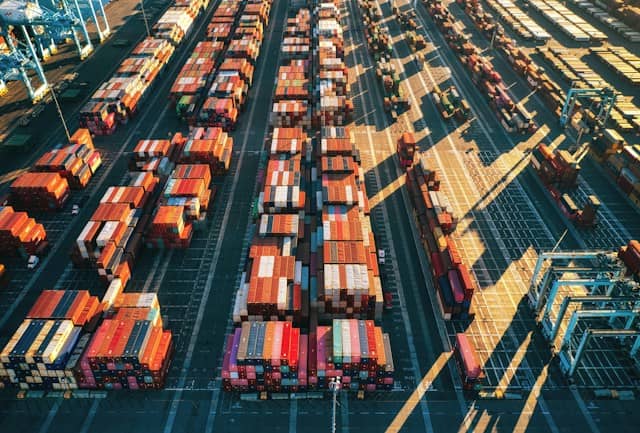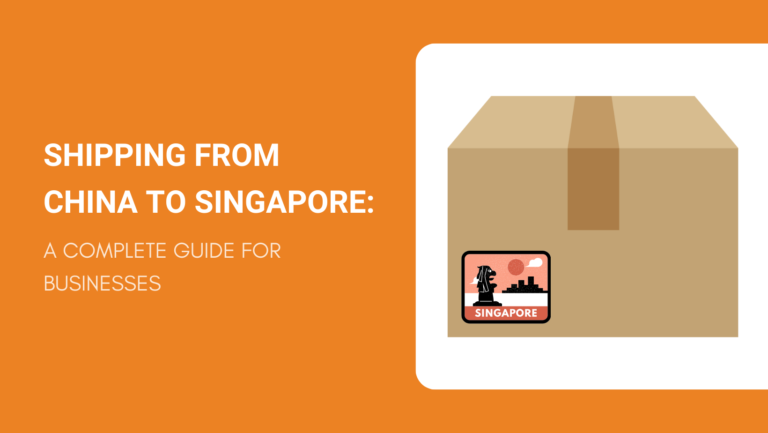For businesses that thrive on international trade, the route from China to Singapore is as crucial as any major highway.
We recognize that understanding the nuances of shipping logistics is the backbone of successful trade, especially considering the volume and strategic significance of China-Singapore commerce.
Our shared objective is seamless supply chain efficiency, which hinges on selecting the right shipping options and partners.
As we navigate through global shipping intricacies, it’s vital for us to stay informed on the major shipping routes, ports, and the various cost considerations when moving goods from China to Singapore.
Knowing the ins and outs of customs regulations and import duties can also make or break the speed and economy of our shipments.
Let us guide you through the process, ensuring your business stays on the fast track to success.
Market Insights: China to Singapore Trade
Understanding the trade dynamics between China and Singapore is essential for savvy businesses and retailers.
We’ve seen that China’s role as a manufacturing powerhouse significantly benefits Singaporean retailers and consumers. The variety and volume of goods flowing from China to Singapore are tremendous, ranging from electronics to fashion items.
When it comes to maritime transport, the China-Singapore International Land-Sea Trade Corridor has increased efficiency while providing a direct connection for cargo movement.
This corridor serves as a primary route for sea freight, affecting how businesses manage logistics and inventory. Speed and reliability in maritime shipping are vital factors to ensure timely delivery.
In contrast, air cargo offers a faster option for shipping goods. Although generally more expensive than sea freight, the use of air transport from China to Singapore can be justified for certain high-value or time-sensitive products.
It allows businesses to provide faster service where necessary, enhancing their ability to meet consumer demands quickly.
In terms of volume, the exports from China to Singapore have significantly increased over the years. Integrated circuits, refined petroleum, and computers are among the top exports. Here’s a brief overview of trade values:
| Year | Export Value (USD) |
| 1995 | 3.89B |
| 2021 | 53.9B |
This upward trend in trade values reflects growing economic interdependency.
As a result, businesses strive to stay informed about changes in trade policies, tariffs, and regulatory requirements that could affect the flow and cost of goods.
Overview of Shipping Options
When considering shipping from China to Singapore, there are two primary methods: ocean freight and air freight.
These methods differ significantly in terms of cost, transit time, and capacity, making it essential to choose the one that aligns with your cargo requirements and business strategies.

Ocean Freight
Ocean freight is a cornerstone of international logistics and a cost-effective solution for transporting large volumes of cargo. Most businesses utilize both FCL and LCL options to optimize container shipping.
FCL, or Full Container Load, is ideal for large shipments as it offers exclusive use of a container. It can be more cost-effective for sizable loads and provides better security for our goods during maritime commerce.
On the other hand, LCL, or Less than Container Load, is perfect when we don’t have enough cargo to fill an entire container. LCL allows you to pay only for the space you use, making it a practical option for smaller shipments.
Pros
- Cost-Effectiveness: Ideal for large volumes of cargo, ocean freight is generally more affordable than air freight, especially for heavy or bulky shipments.
- Large Capacity: It can accommodate much larger quantities of cargo, making it suitable for sizable shipments.
- FCL and LCL Options: Full Container Load (FCL) offers an exclusive container for a large shipment, enhancing security and potentially reducing costs. Less than Container Load (LCL) allows for flexibility in paying only for the space used, perfect for smaller shipments.
- Lower Carbon Footprint: Compared to air freight, ocean freight generally has a lower environmental impact.
Cons
- Slower Transit Time: Ocean freight takes longer to deliver goods compared to air freight, which can be a drawback for time-sensitive shipments.
- More Susceptible to Delays: Factors like weather conditions, port congestion, and customs delays can affect transit times.
- Higher Risk of Damage: Longer transit times and exposure to varying conditions at sea might pose a higher risk of damage or spoilage for certain goods.
Top-Rated China Freight Forwarder
Expert Shipping Solutions for Your Needs
Air Freight
For expedited delivery, air freight is the preferred option. It’s vital for time-sensitive shipments and provides quicker cargo transit than ocean freight.

Most businesses recommend consolidated shipping as a cost-saving approach, which combines your shipment with others to fill an aircraft.
This allows you to benefit from air freight services while managing costs more effectively.
Leveraging a network of freight forwarding partners, you can make sure that your air cargo reaches its destination promptly, aiding in supply chain optimization and providing robust logistics solutions.
Pros
- Speed: Air freight is much faster than ocean freight, making it ideal for urgent or time-sensitive shipments.
- Reliability: Air freight tends to have more predictable arrival and departure times, with fewer delays than ocean shipping.
- Reduced Packaging: Typically requires less heavy-duty packaging than ocean freight, potentially reducing packing costs.
- Global Reach: Air freight can access almost any global destination with an airport, offering more route flexibility.
Cons
- Cost: Generally more expensive than ocean freight, especially for larger and heavier shipments.
- Limited Capacity: Air freight is constrained by aircraft size and weight limitations, which can be challenging for bulky or extremely heavy cargo.
- Environmental Impact: Air freight has a significantly higher carbon footprint per kilometer/mile than ocean freight.
- Consolidation Required for Cost Management: To manage costs, smaller shipments may need to be consolidated, which can add complexity and slight delays in departure.
Major Shipping Routes and Ports
When moving goods from China to Singapore, it’s essential to know the most efficient maritime transport paths and the key ports handling this cargo.
We’ll guide you through the main shipping lanes that facilitate trade flow, and introduce you to the ports that stand as gateways for logistics management between these two critical trade partners.
Key Shipping Routes
The primary maritime shipping route that links China and Singapore stretches along China’s east coast before reaching the west coast of Singapore.
This passage is crucial for global shipping and plays a significant role in the movement of container shipping between the two countries.
To ensure speedy and efficient cargo handling, choosing the most direct route is important. The most popular routes for this trade corridor include those originating from prominent Chinese ports, such as Shanghai and Ningbo, and heading towards Singapore.
Transit times vary depending on the specific ports of departure and arrival, but maritime transport is favored for its reliability and capacity to move large volumes of goods.
Important Ports
A vast network of ports supports the flow of goods between China and Singapore.
In China, ports such as Shanghai, Ningbo, and Shenzhen are instrumental for outbound shipments. Shanghai, being one of the world’s busiest ports, is a hub for international trade and plays a pivotal role in container shipping.
In Singapore, ports like Tanjong Pagar and Pasir Panjang are specifically geared to facilitate trade routes with China and other global partners.
These ports have advanced cargo handling facilities and are highly efficient, providing a range of services to accommodate the needs of international logistics management.
Together, these ports help to maintain the steady movement of trade and are essential for the global shipping industry.
Cost Considerations in Shipping from China to Singapore

When considering the cost of shipping from China to Singapore, it’s crucial to examine the various factors that impact shipping expenses and to have an idea of the pricing estimates for different transport options.
Being aware of these can help you budget effectively and choose the best shipping method for your needs.
Factors Influencing Costs
The cost of shipping is influenced by several key factors, with container size and shipping method being two of the most significant.
The choice between Full Container Load (FCL) and Less than a Container Load (LCL) can affect the overall cost.
FCL is cost-effective for larger shipments that can fill an entire container, providing exclusivity and security for your cargo. In contrast, LCL could be more economical for smaller shipments since you only pay for the space your goods occupy.
Other factors impacting costs include the distance between the port of departure and arrival, the seasonality affecting sailing schedules, and surcharges that may apply for handling and transporting certain types of goods.
Pricing Estimates
When it comes to getting an idea of pricing, here’s a table with example pricing estimates based on different shipping options:
| Shipping Option | Estimated Cost Range |
| FCL 20′ | $90 – $150 |
| FCL 40′ | $100 – $300 |
| LCL | $5 – $85 per cubic meter |
| Air Freight | $2 – $5 per kilogram |
Remember that these are estimates, and actual prices can vary based on fluctuations in the shipping industry and specific needs of your shipment.
It’s recommended to consult with freight forwarders who can provide precise and current pricing based on the latest market conditions.
Transit Times from China to Singapore
When considering the shipping of goods from China to Singapore, understanding transit times is crucial for optimizing your supply chain. We’re looking at two common freight options: air and sea.

Air Freight is the swifter option, with shipments typically arriving within 1 to 2 days. If we’re considering door-to-door delivery, it’s likely to span 2 to 6 days, encompassing customs clearance and local transportation. This method is ideal for time-sensitive cargo.
In contrast, Sea Freight may vary more significantly in transit time. On average, the ocean container shipping is anticipated to be around 5 to 10 days from port to port.
Below is a summarized table of expected transit times:
| Shipping Method | Transit Time |
| Air Freight | 1-2 days (port to port) |
| 2-6 days (door to door) | |
| Sea Freight | 5-10 days (port to port) |
These durations can be affected by factors such as departure ports, shipping volume, and seasonal variations. It’s always prudent to seek multiple quotes to obtain precise timings for your specific shipment.
Remember that the cheapest option may not always align with your supply chain’s needs, particularly if your cargo transit requires speed and efficiency. In such cases, air freight might be the more practical choice despite its potentially higher costs.
Customs and Import Duties
When shipping goods from China to Singapore, understanding the customs and import duties is crucial to ensure a smooth delivery process.
In Singapore, all imported goods are subject to Goods and Services Tax (GST) and may also incur customs and/or excise duties, depending on the nature of the goods.
Goods and Services Tax (GST): GST is imposed on all imported goods, currently at a rate of 7%. It’s calculated based on:
- The Cost, Insurance, and Freight (CIF) value plus any duty and other charges.
Customs and Excise Duties: Not all items attract customs duties; however, certain categories do incur customs duty. These are termed as dutiable goods, and some of them are the following:
- Intoxicating liquors
- Tobacco products
- Motor vehicles

| Dutiable Good | Customs Duty |
| Alcoholic Beverages | Based on per litre of alcohol and alcoholic strength |
| Tobacco Products | Based on weight and type |
| Motor Vehicles | Varies according to engine capacity and type |
When handling customs compliance, declaring the accurate value and description of the goods is essential. Misdeclaration can lead to penalties or delays.
For a seamless import-export process, ensure all documentation for the shipment is complete and accurate. This includes the invoice, packing list, and Bill of Lading or Air Waybill.
Remember, engaging a reliable freight forwarder or a customs broker can be beneficial to navigate import regulations.
They can assist in customs clearance, ensuring that your shipments comply with both Chinese export regulations and Singaporean import regulations.
Always check the latest guidelines by visiting official resources or consulting with logistics experts.
Tips for Choosing a Shipping Partner
When embarking on the journey of shipping from China to Singapore, selecting the right shipping partner is crucial for ensuring your goods arrive safely and efficiently.
Here, we share some practical tips to help you make the best choice:
1. Research Their Expertise.
We recommend looking for a forwarder with a proven track record in navigating the nuances of the China-Singapore shipping route. This expertise often translates to smoother transitions through customs and adherence to shipping regulations.
2. Evaluate Their Network.
A shipping partner with strong connections in both China and Singapore can provide more reliable and cost-effective services. Assess whether they have established relationships with local carriers and agents.
3. Check for Comprehensive Services.
It’s beneficial to work with a partner that offers a range of services like pick-up, packing, and cargo insurance. Comprehensive services can simplify the logistics process for you.
4. Consider Communication Channels.
Effective communication is key. Opt for a partner who provides clear, timely communication and updates about your shipments.
5. Understand the Pricing Structure.
Transparent pricing helps us avoid unexpected costs. Partners offering quick quotes and clear cost breakdowns are preferable, ensuring we understand every charge involved.
Top-Rated China Freight Forwarder
Expert Shipping Solutions for Your Needs

Best Practices for Efficient Shipping from China to Singapore
Packaging and Handling
Proper packaging is crucial for protecting goods during transit. It is recommended to use sturdy, high-quality materials and ensure items are securely packed within the container.
Bubble wrap, foam, and packing peanuts provide excellent cushioning for fragile items. Waterproofing your packages is also wise, given the varied conditions they may encounter.
For handling, packages must be clearly labeled with handling instructions. This simplifies the process for carriers and minimizes the risk of damage.
Large, readable labels denoting the contents as fragile or heavy aid in appropriately handling your shipments.
Tracking and Managing Shipments
Maintaining good tracking protocols is essential for visibility throughout the shipping process.
Most businesses use updated tracking systems to monitor shipment progress in real-time. This not only keeps them informed but also reassures customers about their cargo’s whereabouts.
You can manage your shipments efficiently by staying proactive. Always be prepared to respond to any delays or issues. Doing so ensures quick resolutions, which keeps your entire shipping process flowing smoothly.
FAQs about Shipping from China to Singapore
This FAQ section addresses some common questions that highlight key considerations and regulations for a smooth and compliant shipping experience.
What Is the Best Shipping Route to Ship from China to Singapore?
The best shipping route depends on various factors, including the urgency of delivery and the nature of the goods being shipped.
Air freight offers the swiftest option, with transit times that can be as short as a few days. For example, shipping from Shenzhen or Shanghai-Pudong to Singapore typically takes about 5 days.
If you’re looking for the most cost-efficient choice, especially for larger shipments, ocean freight is preferable. While it takes longer, it’s more economical for full container loads (FCL) and less than container load (LCL) shipments.
What Are Prohibited Items to Import to Singapore?
Singapore has strict regulations on what can be imported into the country.
Prohibited items include chewing gum, narcotics, counterfeit items, pornographic material, and firearms, among others.
Certain goods like pharmaceuticals, food products, and controlled substances require special permits.
Always check the latest customs guidelines to ensure compliance and avoid any shipping complications.
How Much Tax Will I Have to Pay For Importing Goods from China to Singapore?
Taxes for importing goods into Singapore from China are primarily based on the customs value of the goods, which includes the cost, insurance, and freight (CIF) value.
Goods and Services Tax (GST) is applicable at 7% of the CIF value plus any duty payable. Duties are specific to the type of goods imported, with alcohol, tobacco, and motor vehicles generally attracting higher rates.
Always consult with a customs broker or the Singapore Customs website to get the most accurate information regarding your shipment’s tax implications.
How Can I Reduce My Shipping Costs?
There are several strategies to reduce shipping costs from China to Singapore.
Optimize packaging to ensure it’s as compact and lightweight as possible without compromising the protection of the items.
Consider combining smaller shipments into an LCL to take advantage of better rates.
Analyze different shipping options; sometimes, a combination of sea and air might balance cost and speed.
Negotiate with shipping companies for better rates, especially if you ship regularly.
Lastly, be flexible with your shipping times if possible, as peak season shipments tend to be more expensive.
Streamlining Your Shipping from China to Singapore
To enhance your shipping process from China to Singapore, it’s essential to stay well-informed about the customs regulations, taxes, and various shipping options available.
Understanding whether full container load (FCL) or less than container load (LCL) is the most cost-effective for your shipment size will greatly impact your budget.
Customs clearance can be smooth when you correctly classify your goods and prepare the necessary documentation.
Besides Goods and Services Tax (GST), some items may be subjected to additional customs and excise duties, especially for certain categories such as alcohol or tobacco.
We encourage you to apply these insights diligently to optimize shipping practices.
If our expertise aligns with your business needs and you wish to mitigate complexities while shipping from China to Singapore, feel free to request a quick quote from us at NicheSources.
For a comprehensive logistics solution, consider our freight forwarding services. We offer end-to-end support, handling everything from pickup at the supplier in China to final delivery in Singapore. Our expertise in customs regulations and documentation can significantly streamline your shipping process and help you avoid potential pitfalls.
To get started with a customized shipping plan that includes freight forwarding, request a freight forwarding quote today.

